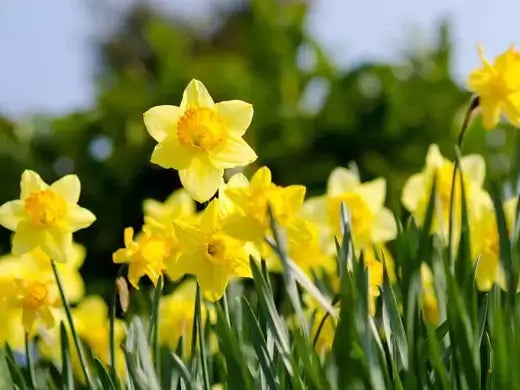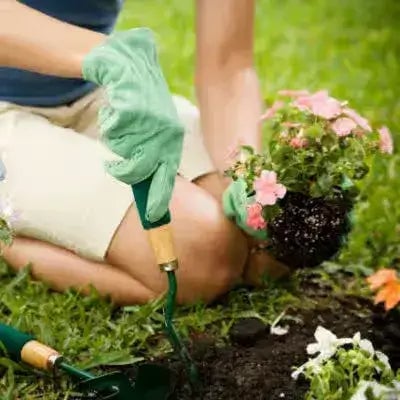10 Easy-to-Grow Plants for Your Garden:
A Beginner's Guide Introduction Gardening can be a rewarding and therapeutic hobby that allows you to connect with nature and enjoy the beauty of the outdoors. If you're a beginner looking for low-maintenance and forgiving plants, you're in the right place. This guide will explore ten easy-to-grow plants perfect for beginners and experienced gardeners. These plants require minimal effort and offer stunning blooms and foliage to enhance outdoor space.
Lavender (Lavandula spp.)
Lavender is a versatile and easy-to-grow plant known for its delightful fragrance and beautiful purple blooms. It thrives in well-draining soil and enjoys plenty of sunlight. Once established, lavender requires little water and is quite drought-tolerant. Pruning the spent flowers will encourage more blooms and help maintain their compact shape.
Marigold (Tagetes spp.)
Marigolds are vibrant annual flowers in various shades of yellow and orange. They are perfect for beginners as they require minimal care and are pretty resilient. Marigolds thrive in full sun. Regular deadheading (removing spent flowers) will encourage continuous blooming throughout the growing season.
Basil (Ocimum basilicum)
Basil is a must-have for herb gardeners. It prefers well-draining soil and plenty of sunlight. Regular harvesting of its leaves will promote bushier growth and prevent it from going to seed too quickly.
Zinnia (Zinnia elegans)
Zinnias are colorful and resilient annual flowers that can brighten up any garden. They come in various colors and shapes, making them popular among gardeners. Regular deadheading will encourage continuous blooming and keep the plants looking neat. Succulents are known for their unique and diverse shapes and ability to thrive in arid conditions. These water-storing plants are perfect for beginners because they require infrequent watering.
Sunflowers (Helianthus annuus)
Sunflowers are not only iconic but also incredibly easy to grow. Their large, cheerful blooms add a touch of summer to any garden. Sunflowers prefer full sun and well-draining soil. They can grow quite tall, so providing support may be necessary to prevent them from toppling over.
Cherry Tomatoes (Solanum lycopersicum)
Growing vegetables can be advantageous, and cherry tomatoes are a great place to start. These small, sweet tomatoes are well-suited for containers and small spaces. They require ample sunlight and consistent watering. Regular pruning and tying will help support the plants as they grow.
Mint (Mentha spp.)
Mint is a fragrant herb known for its rapid growth and versatility. It can be grown in the ground or in containers, making it a popular choice for beginner and experienced gardeners. Mint prefers partial shade and consistently moist soil.
However, be cautious, as mint can be invasive; consider planting it in containers to prevent it from taking over your garden.
Petunia (Petunia spp.)
Petunias are another excellent choice for novice gardeners. These annual flowers are available in various colors and patterns, adding visual interest to any garden space. Regular deadheading will keep the plants blooming profusely.
Chives (Allium schoenoprasum)
Chives are a versatile herb that adds a mild onion flavor to dishes. They are straightforward to grow and require minimal maintenance. Chives can be grown in containers or on the ground and prefer well-draining soil and sunlight. Regular harvesting promotes new growth and prevents the plants from becoming too leggy.
Gardening is a delightful journey that offers many rewards, from beautiful blooms and fresh herbs to a sense of accomplishment and a deeper connection with nature. For beginners, selecting easy-to-grow plants is a smart way to start this journey confidently.
The ten plants discussed in this guide – lavender, marigold, basil, zinnia, succulents, sunflowers, cherry tomatoes, mint, petunia, and chives – are all beautiful choices that require minimal effort while providing maximum enjoyment.
Remember that gardening is about experimentation and learning
Don't be afraid to get your hands dirty and discover the joy of nurturing these plants as they flourish in your garden.
At its core, gardening is an act of nurturing. Sowing a tiny seed and watching it grow into a flourishing plant is a lesson in patience and the beauty of life cycles. As gardeners care for their plants, they learn to adapt to the changing needs of different species, adjusting watering, sunlight, and soil conditions. This learning and adapting process is valuable in the garden and can translate into practical life skills.
Gardening is a multi-sensory experience that engages all the senses. The vibrant hues of flowers, the rustling of leaves in the breeze, and the earthy scent of the soil create a sensory tapestry that can transport gardeners to a place of tranquility and wonder. The tactile experience of working the ground with one's hands connects individuals to the primal rhythm of nature, fostering a sense of groundedness in an increasingly fast-paced world.
Furthermore, gardening fosters a deep connection with the environment. It encourages understanding the delicate balance in ecosystems, as gardeners witness firsthand the interactions between plants, insects, birds, and other creatures. This newfound appreciation for biodiversity often extends beyond the garden's borders, inspiring individuals to make more sustainable choices in their daily lives.
The rewards of gardening are abundant and diverse. One of the most immediate rewards is the aesthetic beauty that gardens bestow upon their surroundings. A well-tended garden can transform a mundane space into a visual masterpiece, inviting admiration from passersby. Moreover, harvesting home-grown fruits, vegetables, and herbs is a gratifying experience connecting individuals to the origins of their food.
On a personal level, gardening is known to have therapeutic effects
Gardening can reduce stress, anxiety, and depression, serving as horticultural therapy. The repetitive tasks of weeding, planting, and pruning can have a calming effect on the mind. At the same time, the satisfaction of nurturing living beings can boost self-esteem and a sense of accomplishment. In conclusion, gardening is a delightful journey that offers many rewards beyond what meets the eye.
It is an invitation to slow down, connect with nature, and witness the miracles of growth and transformation. Whether cultivating a small balcony garden or tending to an extensive backyard oasis, individuals who embark on this journey will indeed find themselves enriched by the experience in ways that extend far beyond the borders of their garden beds.
Building an Easy-Grow Garden Bed for Beginners
Cultivating your garden space with easy-to-grow plants delivers satisfaction while reducing stress so you can produce fresh produce, herbs, and flowers. You can achieve gardening success by choosing sturdy plants that are great for beginners to grow and by developing a supportive, growing environment even when you lack extensive gardening skills or time. This complete manual provides detailed instructions for every stage, which includes selecting a suitable site and maintaining the bed properly to develop a thriving garden with non-problematic plants.
1. Choosing the Right Location
The choice of location for your garden bed stands as one of your most important decisions. Plants that grow quickly require an area that gets six hours of direct sunlight daily to thrive. When you're unsure about how much sun a space receives, you should monitor it for multiple days to track the duration of sunlight exposure. Most vegetable and flower crops grow better with good air circulation, so avoid planting near walls or fences where air stagnates.
The distance of the location from a water source remains a critical consideration. Beginner-friendly plants display some drought resistance but still need regular watering during hot weather and dry spells. Access to a spigot or hose nearby makes watering plants much more manageable. Finally, ensure the area has adequate drainage. When rainwater collects in one location, you may need to elevate your garden bed or improve soil drainage.
2. Deciding on the Type of Garden Bed
You should select an in-ground or raised bed based on available space materials and your preferences. In-ground beds require digging into existing soil to remove turf or weeds before enhancing native soil with compost or additional materials. This method saves money because you only need to work with the soil already present at the site. Amending your native soil to improve it becomes time-intensive when dealing with heavy clay or nutrient-deficient ground.
Raised bed gardens consist of framed constructions typically constructed from wood, cinder blocks, or composite materials, and these frames contain a superior-quality soil mixture. These framed planting structures heat up sooner during springtime while providing excellent drainage and giving gardeners complete control over the soil they use. Although creating raised beds requires higher initial expenditures for building materials and imported soil, they deliver healthier plants with more prolific growth. Raised beds provide accessibility benefits for people with mobility issues because builders can set the height to minimize bending or kneeling.
3. Preparing the Soil
Healthy soil is a fundamental foundation for any garden but becomes crucial when you want easy-to-grow plants to achieve maximum growth. First, eliminate all weeds and grass until the soil is between eight and ten inches deep. Then, a raised bed should be filled with a soil blend of two-thirds topsoil and one-third compost. Compost gives organic matter to the soil, enhancing soil structure and nutrient availability and facilitating plant root growth.
Add a few layers of compost or manure to in-ground beds and mix it thoroughly. Perform a soil test to determine the concentrations of pH and nutrients. The ideal soil pH ranges from slightly acidic to neutral for most popular garden plants, between 6.0 and 7.0. Amend your soil according to package instructions when tests show it needs lime or sulfur to increase or decrease pH. Investing time into soil preparation now will help you avoid multiple challenges as your growing season progresses.
4. Selecting Easy-to-Grow Plants
Select plants that require minimal care after confirming your soil's readiness. Some top picks include:
Leafy Greens (Lettuce, Spinach, Kale): These cool-season crops develop rapidly and provide ongoing yields as long as you consistently harvest the outer leaves.
Herbs (Basil, Mint, Thyme): Herbs perform best under moderate growing conditions and produce aromatic foliage that can be used for culinary purposes or in tea blends. Mint grows aggressively, so you should plan to plant it in its pot.
Tomatoes (Cherry Varieties): Cherry tomatoes show greater tolerance than larger heirloom varieties. These plants demonstrate pest resistance while yielding plentiful fruit.
Peppers (Bell or Sweet Varieties): After establishment and regular watering, peppers require minimal care. Containers make a growing environment for peppers when outdoor space is restricted.
Marigolds and Zinnias (Flowers): Bright blooms from these plants grow easily when planted from seeds. These plants deliver bright colors and draw beneficial insects while keeping some pests away.
5. Planting and Spacing
Follow the planting instructions for each plant variety, which outline the appropriate seeding depth and transplant spacing needs. If plants grow too close together, they struggle to develop correctly and become more susceptible to disease. Tomatoes require support structures like cages or stakes to remain upright during their growth process. Early attention to these needs results in an organized and manageable space.
6. Watering and Fertilizing
Young seedlings and newly transplanted starts require proper watering to thrive. A weekly water intake of about one inch is usually adequate for many easy-to-grow plants, but this requirement changes depending on the soil type and current weather conditions. An essential rain gauge enables you to monitor precipitation levels, but remember to give plants a deep watering if rain does not provide enough moisture instead of using short, frequent sprays.
Slow-release formulas with balanced nutrients typically offer effective fertilization results. Excessive fertilizer use produces dense foliage at the expense of flower and fruit production, so apply fertilizers sparingly. Numerous gardeners select organic solutions such as compost tea and worm castings to maintain steady feeding for their plants during the growing season.
7. Mulching and Weed Control
Mulch is a gardener's best ally when cultivating low-maintenance plants. Organic mulch layers between two and three inches deep help maintain soil moisture while controlling weed growth and stabilizing soil temperature. Avoid placing mulch directly against plant stems, and keep a few inches of separation to protect your plants from rotting and pest infestations.
By consistently removing weeds and lightly tilling the topsoil, you prevent competition, enabling better access to light and nutrients for your plants. The mulch barrier keeps weed growth low, which helps minimize maintenance work.
8. Routine Inspection and Harvesting
After an initial setup, a simple garden bed needs very little maintenance work. Check your plants regularly for any indication of pest activity or disease presence. Early detection of problems leads to more straightforward management solutions. Collect leafy greens and herbs as soon as they reach a harvestable size because picking mature leaves and fruits stimulates new growth and extends production time.
Replant or sow new seeds in open spaces to ensure continuous growth of easy-to-grow crops. When midsummer heat causes early lettuce to bolt, substitute it with late-season vegetables or plant another round of fast-growing greens.
Creating a successful garden bed for beginner-friendly plants requires careful consideration of placement, soil composition, and plant selection. A firm foundation established during garden bed setup ensures consistent benefits throughout the growing season, whether you choose an in-ground patch or raised beds. Choosing durable plants while maintaining steady watering and nutrient supply alongside weed control results in a productive garden space that requires minimal maintenance and delivers continuous contentment. These strategic steps enable even beginners or those lacking time to develop a garden bed that produces fresh vegetables and beautiful flowers every season while remaining visually appealing and productive.
Read more

Daffodil bulbs are one of the easiest to plant in your garden, but you should know your varieties before planting. Daffodils are resilient flowers by nature, and growing them can be pretty easy if ...

One of our best-selling trees at our nursery is the California Privet Hedge. It's an evergreen, so you will not have to worry about not having adequate privacy in the winter. An evergreen conifer n...


